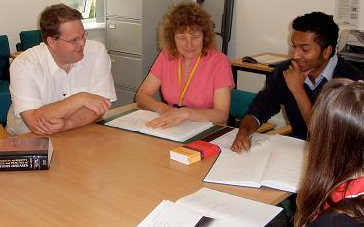 Posts are offered for Run Through Training in both Medical Microbiology and Virology.
Posts are offered for Run Through Training in both Medical Microbiology and Virology.
Whilst these disciplines are laboratory based, they have a strong emphasis on clinical liaison and supporting clinical colleagues in diagnosis and management of complex problems.
There is also a component of organisation wide support through policy and strategy development in key areas such as antibiotic prescribing and Infection Control.
There is an important element of liaison with colleagues in the community responsible for Health Protection, as well as supporting GPs and PCTs in individual patient management and policy development.
Consultant Microbiologists/Virologists also have a role in laboratory management, requiring leadership skills and team working skills.
The laboratory role is reflected in the acquisition of key laboratory skills in the first years of training. The trainee will gain experience in all aspects of clinical microbiology and virology, including the authorisation of laboratory results and taking clinical calls.
The Clinical liaison role is reflected by all placements in the region having strong clinical links including daily Consultant or Registrar led ward rounds, to ITU and general wards where there are other interesting cases. The trainee will also develop a working knowledge of laboratory management, audit and Quality Assurance and Quality Control.
The trainee will also be a member of the Infection Control team at each Trust, dealing with outbreak situations (MRSA, Clostridium difficile etc) building the understanding and experience necessary to undertake the role of Director of Infection, Prevention and Control.
The Royal College of Pathologists (RCPath) curriculum has been agreed with the PMETB and is the basis for your training.
Curriculum for Specialist Training in Medical Microbiology and Virology - Jan 2007
You will receive a training plan for each placement, agreed with your Educational Supervisor, and develop a timetable of activity at each placement, this will encompass both your needs and the clinical needs of the Trust. Service commitment can be expected to be 60-80%. Trainees will have time available to participate in research projects as part of their training. There are mandatory Regional study days, which cover areas of the curriculum which may not be so easily covered in placements, and offer opportunities for the regional trainees to meet and support each other by sharing presentations and some exam preparation.
Assessments are collated by RCPath, trainees will be expected to undertake workplace-based assessment throughout the duration of their training. There is an 8 month OSPE (Objective Structured Practical Examination) run by the RCPath. The other major summative assessments are FRCPath Part 1 and 2 occurring in Year 1 and Years 3-4 respectively. Acquisition of FRCPath is required for the eventual reward of the CCT. Trainees will undergo an annual ARCP at which evidence of their competence and progress will be assessed, this will be assessed using work place based assessments, summative assessments, correctly maintained and updated log-book and portfolio, appraisals and educational supervisors report.
The trainee will have a formative/supportive appraisal at least twice a year, this should inform the planning of future educational needs.